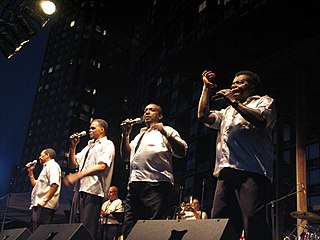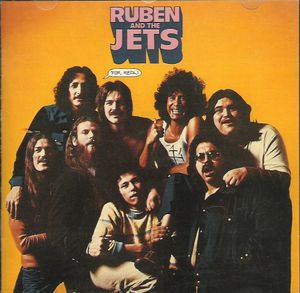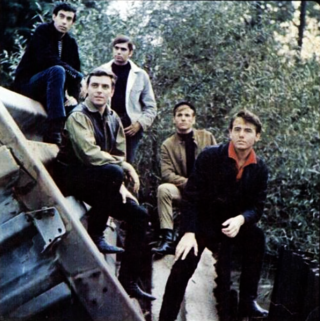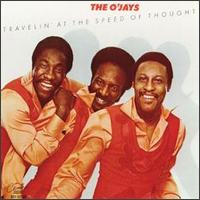
Doo-wop is a subgenre of rhythm and blues music that originated in African-American communities during the 1940s, mainly in the large cities of the United States, including New York, Philadelphia, Pittsburgh, Chicago, Baltimore, Newark, Detroit, Washington, D.C., and Los Angeles. It features vocal group harmony that carries an engaging melodic line to a simple beat with little or no instrumentation. Lyrics are simple, usually about love, sung by a lead vocal over background vocals, and often featuring, in the bridge, a melodramatically heartfelt recitative addressed to the beloved. Harmonic singing of nonsense syllables is a common characteristic of these songs. Gaining popularity in the 1950s, doo-wop was "artistically and commercially viable" until the early 1960s and continued to influence performers in other genres.

Parliament-Funkadelic is an American music collective of rotating musicians headed by George Clinton, primarily consisting of the funk bands Parliament and Funkadelic, both active since the 1960s. Their eclectic style has drawn on psychedelia, outlandish fashion, and surreal humor. They have released albums such as Maggot Brain (1971), Mothership Connection (1975), and One Nation Under a Groove (1978) to critical praise, and scored charting hits with singles such as "Tear the Roof Off the Sucker" (1975) and "Flash Light" (1978). Overall, the collective achieved thirteen top ten hits in the American R&B music charts between 1967 and 1983, including six number one hits. Their work has had an influential effect on subsequent funk, post-punk, hip-hop, and techno artists of the 1980s and 1990s, while their collective mythology has helped pioneer Afrofuturism.

The Flamingos are an American doo-wop group formed in Chicago in 1953. The band became popular in mid-to-late 1950s and are best known for their 1959 cover version of "I Only Have Eyes for You". They have since been hailed as one of the finest and most influential vocal groups in pop and doo wop music history. In 2001, the band was inducted into the Rock and Roll Hall of Fame.

The O'Jays are an American R&B group from Canton, Ohio, formed in summer 1958 and originally consisting of Eddie Levert, Walter Lee Williams, William Powell, Bobby Massey, and Bill Isles. The O'Jays made their first chart appearance with the minor hit "Lonely Drifter" in 1963, but reached their greatest level of success once the producers Gamble & Huff signed them to their Philadelphia International label in 1972. With Gamble & Huff, the O'Jays emerged at the forefront of Philadelphia soul with Back Stabbers (1972), and topped the US Billboard Hot 100 the following year with "Love Train". Several other US R&B hits followed, and the O'Jays were inducted into the Vocal Group Hall of Fame in 2004, The Rock and Roll Hall of Fame in 2005, and the Rhythm and Blues Music Hall of Fame in 2013.
The Wrens were an American doo-wop vocal group from The Bronx, New York City. They are best known for their song "Come Back My Love" and "I'm Just the Kind of Guy".

Little Anthony and the Imperials is an American rhythm and blues/soul vocal group from New York City founded by Clarence Collins in the 1950s and named in part for its lead singer, Jerome Anthony "Little Anthony" Gourdine, who was noted for his high-pitched voice. In addition to Collins and Gourdine, the original Imperials included Ernest Wright, Gloster "Nate" Rogers, and Tracy Lord, the last two of whom were subsequently replaced by Sammy Strain.

For Real! is an album by Ruben and the Jets, and the debut of musician Rubén Guevara Jr.'s new lineup, after the group name had previously been used as an alias of The Mothers of Invention in 1968. Released in 1973, For Real! was produced by Frank Zappa, who wrote the first track and played guitar on the second track. The album consists of blues, rhythm and blues and rock and roll music.
Ruben and the Jets was an American rock and roll band from Los Angeles, California. The band originated as an alias for The Mothers of Invention, Frank Zappa's band, to release Cruising with Ruben & the Jets (1968). Later, musician Rubén Guevara Jr. continued the band with his own lineup. Guevara's "Jets" recorded two albums, For Real! (1973) and Con Safos (1974).
"Rubber Biscuit" is a novelty doo-wop song performed by the vocals-only team the Chips, who recorded it in 1956. It was covered by the Blues Brothers on their 1978 debut album, Briefcase Full of Blues, among many other artists, as well as being featured in the 1973 film Mean Streets.

"Gee" is a song by American R&B and doo-wop group the Crows, released in June 1953. The song has been credited as the first rock and roll hit by a rock and roll group. It is a doo-wop song, written by William Davis and Viola Watkins, and recorded by the Crows on the independent label, Rama Records, at Beltone Studios in New York City in February 1953. It charted in April 1954, one year later. It took a year to get recognized on Your Hit Parade. It landed No. 2 on the rhythm and blues chart and No. 14 on the pop chart. It was the first 1950s doo-wop record to sell over one million records. Recorded on an independent label, it was one of the first such R&B records to crossover to the wider pop market. Some, including Jay Warner, consider it as the first of the "rock and roll records".
Ulysses B. "Bobby" Nunn Sr. was an American R&B singer with the musical groups The Robins and original bass vocalist of The Coasters. He was born in Birmingham, Alabama, United States, and died of heart failure in Los Angeles, California, U.S.
Non-lexical vocables, which may be mixed with meaningful text, are a form of nonsense syllable used in a wide variety of music. Common English examples are "la la la", "na na na" and "da da da".

Kenny Vance is an American singer, songwriter, and music producer who was a founding member of Jay and the Americans. His career spans from the 1950s to today, with projects ranging from starting doo-wop groups to music supervising to creating solo albums.
"I'm on the Outside (Looking In)" is a 1964 hit song by Little Anthony and the Imperials, issued on DCP Records. It was a Billboard top 20 pop hit, peaking at number 15, and number 12 in Canada.

Travelin' at the Speed of Thought is an album by the American R&B group the O'Jays, released in 1977 on Philadelphia International Records. Unusual for the time, there had been no advance single release from the album; the only single subsequently issued, "Work on Me", became a #7 R&B hit but failed to reach the pop listings, making this the first O'Jays PIR album without a top 100 pop single. Travelin' at the Speed of Thought peaked at #6 on the R&B chart and reached #27 on the pop chart. The album achieved a gold certification.

The Earth Angels are a Spanish doo-wop vocal group from Barcelona, Catalonia which performs a cappella music. On tour, they also sing on city streets. The group formed in 2007, when bass-baritone Christian Carrasco announced that he was looking for a doo-wop singer and found lead vocalist Jordi Majó.

Lillian Leach, also known by her married name, Lillian Leach Boyd, was an American singer who performed lead vocals with the Bronx-based doo-wop group the Mellows. She was noted for her mellifluous voice and wistful singing style. The Mellows recorded several hit songs in the 1950s, including "Smoke From Your Cigarette", "Yesterday's Memories", and "How Sentimental Can I Be?"
The Viscaynes were an American doo-wop group from Vallejo, California, United States, that released a few singles in the early 1960s. They also had a regional hit with the song "Yellow Moon". One of their members Sylvester Stewart, later known as Sly Stone would front the multi-racial group Sly & the Family Stone. They were unique in being one of the very few integrated doo-wop groups of their time.
Samuel Strain Jr.note is an American R&B vocalist, known for his time as a member of Little Anthony and the Imperials and The O'Jays (1976–1992).










